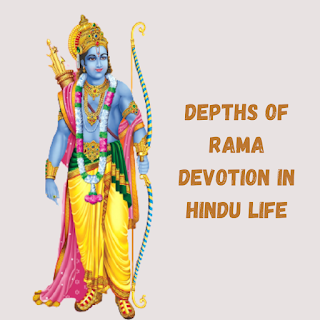Devotion to Lord Rama is a central facet of Hindu spirituality, rooted in the ancient Indian epic, the Ramayana. Rama, revered as the seventh incarnation of Lord Vishnu, embodies ideals of righteousness, duty, and virtue. Devotees express their reverence through various forms of worship, rituals, and devotional practices.
One of the primary ways Hindus demonstrate devotion to Lord Rama is through prayer and meditation. Recitation of Rama Mantra, such as the famous "Om Sri Ram Jai Ram Jai Jai Ram," is a common practice. Devotees believe that chanting these sacred words invokes divine blessings, purifies the mind, and strengthens the connection with Lord Rama.
Temples dedicated to Lord Rama, like the iconic Ramanathaswamy Temple in Rameswaram, stand as focal points for devotees. Pilgrims embark on journeys to these sacred sites, seeking spiritual upliftment and a closer communion with their beloved deity. The act of visiting these temples symbolizes a physical and spiritual pilgrimage, reflecting the devotee's commitment to their faith.
Festivals play a crucial role in expressing devotion to Lord Rama. Ram Navami, the birthday of Lord Rama, witnesses elaborate celebrations across the country. Devotees engage in special prayers, processions, and reenactments of scenes from the Ramayana. Such festivities not only celebrate the divine but also serve as occasions for fostering a collective sense of devotion and cultural identity.
The epic itself, the Ramayana, serves as a sacred scripture guiding devotees on the path of righteousness. Reading or listening to the Ramayana is a devotional practice that imparts moral and spiritual lessons. The exemplary life of Rama, his unwavering commitment to dharma (righteousness), and the profound love between Rama and his consort Sita inspire millions to lead virtuous lives.
Bhakti, or devotional love, is a fundamental aspect of Rama devotion. Devotees cultivate a deep, personal connection with Lord Rama, viewing him not merely as a deity but as a compassionate and understanding friend. This intimate relationship allows individuals to find solace in times of adversity and joy in moments of gratitude, fostering a sense of divine companionship.
The devotional aspect of Rama worship extends beyond religious boundaries, transcending caste, creed, and social status. It unifies people in a shared reverence for universal values and spiritual principles embodied by Lord Rama. Devotees often engage in acts of charity, selfless service, and compassion, reflecting the teachings of their beloved deity.
In conclusion, devotion to Lord Rama is a multifaceted expression of spiritual connection deeply ingrained in Hindu culture. Through prayer, pilgrimage, festivals, scripture, and the cultivation of bhakti, followers of Lord Rama seek not only divine blessings but also the transformative power of a virtuous and purposeful life. The timeless appeal of Rama's story continues to inspire millions, serving as a beacon of light guiding them on their journey towards spiritual fulfillment and righteousness.
